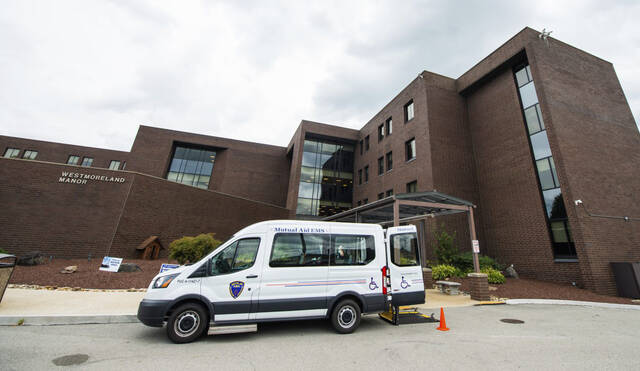https://triblive.com/local/westmoreland/brown-university-study-flags-4-southwestern-pa-nursing-homes-at-risk-under-medicaid-cuts/
Brown University study flags 4 Southwestern Pa. nursing homes ‘at risk’ under Medicaid cuts

Four Southwestern Pennsylvania nursing homes could be in trouble after approval of the federal spending plan described by President Donald Trump as the “One Big Beautiful Bill,” according to a Brown University study.
But the variation in funding formulas could limit the impact on facilities identified in the study, according to the leader of a health care coalition.
The study identified nearly 600 nursing homes nationwide that are put at risk by the legislation’s Medicaid adjustments, including 15 in Pennsylvania. Facilities deemed at risk have occupancy rates below 80%, and more than 85% of their residents rely on Medicaid to finance their care.
Two Allegheny County facilities, one in Westmoreland County and one in Somerset County, were identified.
Health expert: Pa. has history with closures
More than 30 nursing homes statewide have closed since 2019, including a handful in Southwestern Pennsylvania, said Zach Shamberg, president and CEO of the Pennsylvania Health Care Association.
One of the Allegheny facilities identified in the study, the Pittsburgh Skilled Nursing and Rehabilitation Center in Shadyside, closed in August 2024, putting 140 residents out of a home.
Brown professor Vincent Mor conducted the study using 2023 data from the Centers for Medicare and Medicaid Services — the latest information available. He said other facilities mentioned in the study may have closed since the data was compiled.
“It is encouraging that a facility that we deemed to be ‘at risk’ actually did close,” he said via email.
Nonprofit homes to see limited impact, expert says
Westmoreland Manor, a county-owned facility in Hempfield, was identified in the study. Although nursing home Administrator Abby Steele is keeping a close eye on the Medicaid cuts, she is not yet concerned for Westmoreland Manor’s longevity.
“We are absolutely following it, and if something comes out in the future, we will work through it at that time,” she said.
About 95% of Westmoreland Manor’s residents rely on Medicaid, Steele said.
Cheswick Rehabilitation and Wellness Center in Indiana Township and the Meadow View Nursing Center in Berlin Borough also were identified in the study. Messages seeking comment from the facilities’ administrators were not returned.
The Pennsylvania Coalition of Affiliated Healthcare and Living Communities advises county-owned, nonprofit nursing homes statewide, including Westmoreland Manor. Executive Director Chase Cannon said these types of facilities will not be impacted by the Medicaid adjustments in the same way as privately owned or hospital-run homes — including the Indiana and Berlin facilities.
“From a county standpoint and a nonprofit standpoint, I don’t foresee there being a significant negative impact to the residents on Medicaid,” Cannon said, “just because of how the current provider fee system and the state-directed payment formulas are used when funding nonprofit and county nursing homes.
“I can’t say the same when it comes to hospital-run facilities and privately owned homes, just because their funding formulas are different. They work more off of the provider fee system, which I know has some limitations.”
The provider fee system, also known as the provider assessment, is a tax imposed by states on their hospitals based on the facilities’ net patient revenue. The federal government matches the tax, and all of the payments go toward reimbursing hospitals for the care they administer to Medicaid patients.
Provider assessment dollars, Cannon said, make up just 10% of the funding for Pennsylvania’s county-owned and nonprofit nursing homes.
Cannon also argued that the nursing homes study should have taken other factors into account to determine risk — including the ratio of residents on Medicaid versus Medicare, facility cost reports and state budget figures.
